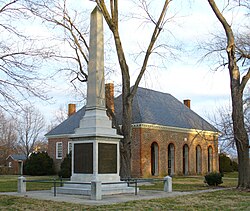Hanover County Courthouse
|
Hanover County Courthouse
|
|

Historic Hanover County Courthouse and Hanover Civil War Memorial
|
|
| Location | Hanover Court House, Virginia |
|---|---|
| Coordinates | 37°45′47″N 77°22′3″W / 37.76306°N 77.36750°WCoordinates: 37°45′47″N 77°22′3″W / 37.76306°N 77.36750°W |
| Built | 1735 |
| Architect | Unknown |
| Architectural style | Georgian |
| Part of | Hanover County Courthouse Historic District (#71000980) |
| NRHP Reference # | 69000247 |
| VLR # | 042-0016 |
| Significant dates | |
| Added to NRHP | October 1, 1969 |
| Designated NHL | November 7, 1973 |
| Designated CP | September 22, 1971 |
| Designated VLR | November 5, 1968 |
Hanover County Courthouse is an historic courthouse located in the community of Hanover Courthouse, the county seat of Hanover County, Virginia. Built about 1735, it is one of the nation's oldest courthouses still in use for that purpose. It is historically notable as the site of the Parson's Cause case, which was argued by Patrick Henry in 1763. It was designated a National Historic Landmark in 1973. A modern courthouse complex stands nearby, which now houses most of the county's judicial functions.
The Hanover County Courthouse is located in the center of the small community formally called Hanover Courthouse (but is more colloquially known just as "Hanover"). It is set on a grassy quadrangle on the north side of United States Route 301, with other 18th-century buildings nearby that make up the Hanover County Courthouse Historic District. It is a single story brick building, with a tall hipped roof with modillioned cornice, and three chimneys. It is laid out in a T shape, with the courtroom in the rear-projecting leg of the T, the judge's quarters on the left side, and a jury room on the right. The front of the building is distinguished by an arcade of rounded arches.
Hanover County was created in 1720 by the Colony of Virginia. The courthouse was built about 1735, supposedly by William Meriwether, who also built and operated the original Hanover Tavern, just across the main road. Its design was apparently based on the courthouse of King William County to the northeast.
In 1763, Patrick Henry, who lived and practiced law in Hanover County, argued the case of the Parson's Cause, involving King George III's veto of local legislation changing tax rates for the support of local Anglican ministry despite their objections and those of the House of Burgesses. Henry, representing the County, accused the King of tyranny in overturning colonial law without regard to the wishes of his subjects.
...
Wikipedia

